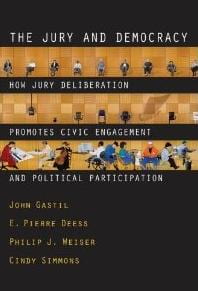


Writings
Book published
We have combined all of our project’s findings in a new book by Oxford University Press, The Jury and Democracy: How Jury Deliberation Promotes Civic Engagement and Political Participation. You can order copies online directly from Oxford University Press or at Amazon.com.
Can’t decide whether to get it? Read chapter 1 of the The Jury and Democracy as a free pdf.
Some very nice people have already said very nice things about the book. Here’s one of our favorite quotes:
“I have been waiting decades for a study like this. For the first time we have data on a large sample showing indisputably that taking civic responsibility in one realm promotes taking civil responsibility later in another. This groundbreaking, careful, and illuminating study is a must for anyone interested in what political theorists have long called the ‘educative effects’ of participation.”
–Jane Mansbridge, Adams Professor of Political Leadership and Democratic Values, Kennedy School, Harvard University
Publications
Hans, V. P., Gastil, J., & Feller, T. (2014). Deliberative democracy and the American civil jury. Journal of Empirical Legal Studies, 11, 697-717. Shows that civil jurors are most likely to increase their future voting rates if they serve on a twelve person jury that requires unanimity for a verdict, and the effect is more likely for cases brought against an organization, rather than an individual. A short essay summarizing this article appeared in a 2016 issue of Voir Dire magazine.
Gastil, J., Fukurai, H., Anderson, K., & Nolan, M. (2013). Seeing is believing: The impact of jury service on attitudes toward legal institutions and the implications for international jury reform. Court Review, 48, 125-130. Main finding: Jury service generates positive attitudes toward juries and judges.
Sprain, L., & Gastil, J. (2013). What does it mean to deliberate? An interpretative account of the norms and rules of deliberation expressed by jurors. Communication Quarterly, 61, 151-171. Shows how jurors conceptualize and experience deliberation, using jurors’ own written accounts of their service.
Gastil, J., & Xenos, M. (2010). Of attitudes and engagement: Clarifying the reciprocal relationship between civic attitudes and political participation. Journal of Communication, 60, 318-343. Shows precisely which political behaviors and attitudes mutually influence one another.
Deess, P., & Gastil, J. (2009). How jury service makes us into better citizens. The Jury Expert, 21. Provides an overview of the project, with an emphasis on the impact of criminal jury service on voting rates.
Gastil, J., Lingle, C. J., & Deess, E. P. (2009). Deliberation and global criminal justice: Juries in the international criminal court. Ethics & International Affairs, 24, 69-90. Proposes that the World Court periodically convene global juries and provides both a philosophical justification and suggestions for how to handle the logistical complexities of such a body.
Gastil, J., Deess, E. P., Weiser, P., & Meade, J. (2008). Jury service and electoral participation: A test of the participation hypothesis. Journal of Politics, 70, 1-16. Main finding: Jury service makes people more likely to vote in future elections. This refines the results of the 2002 study (below) by looking in more detail at a larger juror sample from multiple locales in the United States.
Gastil, J., Leighter, J., Black, L., & Deess, E. P. (2008). From small group member to citizen: Measuring the impact of jury deliberation on citizen identity and civic norms. Human Communication Research, 34, 137-169. Previous version presented at the 2005 annual conference of the National Communication Association, Boston, MA. Main finding: Jury deliberation promotes more positive civic attitudes.
Hickerson, A., & Gastil, J. (2008). Assessing the difference critique of deliberation: Gender, emotion and the jury experience. Communication Theory, 18, 281-303. Main finding: Jurors from different backgrounds give very similar assessments of their deliberation, contrary to what some critics had expected.
Gastil, J., Burkhalter, S., & Black, L. (2007). Do juries deliberate? A study of deliberation, individual difference, and group member satisfaction at a municipal courthouse. Small Group Research, 38, 337-359. Main finding: Jurors generally believe they deliberated and what individual and group characteristics were conducive to higher levels of deliberation.
Gastil, J. (July 26, 2007). Jury duty in Japan. New York Times. A brief letter to the editor about our project in relation to the new jury system now implemented in Japan.
Gastil, J., & Weiser, P. (2006). Jury service as an invitation to citizenship: Assessing the civic value of institutionalized deliberation. Policy Studies Journal, 34, 605-627. Main finding: Satisfying jurors’ expectations for jury service yields changes in selected civic and political behaviors.
Gall, A., & Gastil, J. (2006). The magic of Raymond Burr: How jury orientation prepares citizens for jury service. Court Manager, 21(2), 27-31. Main finding: Exposure to jury orientation briefly increases prospective jurors’ approval of the jury system and their willingness to serve.
Gastil, J., Deess, E. P., & Weiser, P. (2002). Civic awakening in the jury room: A test of the connection between jury deliberation and political participation. Journal of Politics, 64, 585-595. Main finding: Jury service promotes future voting in Thurston County, Wash. More recent 2008 study (above) elaborates on these findings.
Additional Writings
Consolini, P. (1992). Learning by doing justice: Private jury service and political attitudes. Doctoral dissertation, University of California at Berkeley. This landmark study, funded by the National Science Foundation, helped to close the gaps between jury research, political participation research, and studies of the relationship between legal institutions and political attitudes.
Another reason to embrace jury duty. University of Washington A&S Perspectives. A brief article on The Jury and Democracy.
Drafts In Progress
Sprain, L., Black, L., & Gastil, J. (2008). First among Strangers: The Selection of Forepersons and Their Experience as Leaders in Civil and Criminal Juries. Executive summary of paper presented at the 2008 INGRoup conference. Looks at the unique experience of serving as a jury foreperson.
Executive Summary for Study Participants
Gastil, J., Weiser, P., & Deess, E. P. Executive Summary of findings for King County survey participants. (2006). Summarizes some research findings and describes political activities and attitudes in King County.